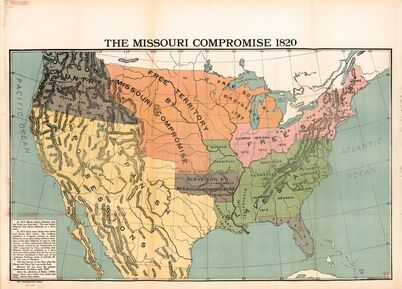 Source: Library of Congress Source: Library of Congress The nineteenth century saw the number of states admitted to the Union increase and along with them a number of measures affecting slavery. Debates over how to deal with slavery in new states and territories generated new laws and challenges to personal freedom. In 1803 Congress approved President Jefferson’s Louisiana Purchase from France virtually doubling the nation’s size. In 1807, Congress banned the importation of slaves into the United States although this resulted in an increase in domestic slave trading in the South. In 1812, Louisiana became the first state created from the Louisiana Purchase entering the Union as a slave state. Pro- and anti-slavery passions were inflamed and skillful diplomacy and compromise were essential. For only a short while they prevailed. The Missouri Compromise of 1820 was an effort to preserve the balance of power between pro- and anti-slavery factions in the United States Congress. In 1820 Maine entered the Union as the 12th “free” state joining Illinois, Indiana, Ohio, Pennsylvania, New York, New Jersey, Rhode Island, Massachusetts, Connecticut, Vermont, and New Hampshire. The eleven slaveholding states were Kentucky, Tennessee, Maryland, Virginia, Delaware, North Carolina, South Carolina, Georgia, Alabama, Louisiana, and Mississippi. In 1821, Missouri entered the Union as the nation’s 24th state and the 12th slave-holding state, thus maintaining the balance of slave and free states. An essential element of this compromise was the amendment authored by Senator Jesse B. Thomas of Illinois: "And be it further enacted, That in all that territory ceded by France to the United States, under the name of Louisiana, which lies north of thirty-six degrees and thirty minutes north latitude, excepting only such part thereof as is included within the limits of the State contemplated by this act (Missouri), slavery and involuntary servitude, otherwise than in the punishment crimes whereof the party shall have been duly convicted, shall be and is hereby forever prohibited: Provided, always, That any person escaping into the same from whom labor and service is lawfully claimed in any other State or Territory of the United States, such a fugitive may be lawfully reclaimed, and conveyed to the person claiming his or her labor or service as aforesaid.” With the exception of Missouri, the proposed amendment established Arkansas’s northern border as the northern limit for slavery to be legal in the western territories. The 16th United States Congress passed the legislation on March 3, 1820, and President James Monroe signed it three days later. Lyman Beecher, Harriet’s father, achieved some degree of notoriety as he publicly preached against slavery in reply to the compromise. As a youngster Harriet overhead conversations about the compromise in her household. After Missouri's admission to the Union in 1821, no other states were admitted until 1836 when Arkansas became a slave state, followed by Michigan in 1837 as a free state. In the 1840s, Florida and Texas were admitted as slave states, and Wisconsin and Iowa as free states. The Missouri Compromise was effectively repealed in 1854 by The Kansas–Nebraska Act, which allowed the people of Kansas and Nebraska to decide whether they would enter the union as a free or slave state. In 1857, the antislavery provision of the compromise was ruled unconstitutional by the Supreme Court in the infamous Dred Scott versus Sanford case. Sources:
About the author:
Dr. Nicholas Andreadis is a volunteer at the Harriet Beecher Stowe House. He was a professor and dean at Western Michigan University prior to moving to Cincinnati.
2 Comments
3/12/2022 02:05:00 pm
Debates over how to deal with slavery in new states and territories generated new laws and challenges to personal freedom. Thank you for taking the time to write a great post!
Reply
8/25/2022 02:17:41 pm
Achieved some degree of notoriety as he publicly preached against slavery in reply to the compromise. As a youngster Harriet overhead conversations about the compromise in her household. Thank you for sharing your great post!
Reply
Leave a Reply. |
Archives
March 2025
Categories
All
|
|

 RSS Feed
RSS Feed